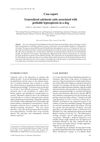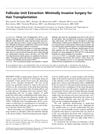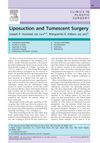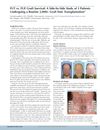 January 2023 in “Food and nutrition sciences”
January 2023 in “Food and nutrition sciences” Most people using the supplement Renew saw health improvements, especially in sleep and energy, faster than with regular vitamins.
[object Object]  October 2022 in “Frontiers in Endocrinology”
October 2022 in “Frontiers in Endocrinology” New tools show that in fish, NPY increases feeding and somatostatin decreases it.
 April 2022 in “Anti-cancer agents in medicinal chemistry”
April 2022 in “Anti-cancer agents in medicinal chemistry” Some existing medicines show promise as safe treatments to protect against the side effects of radiation therapy.
October 2021 in “Case Reports in Veterinary Medicine” The dog died from myxedema coma linked to severe atherosclerosis and thyroid issues.
November 2019 in “BMC veterinary research” The hair loss in Belgian Blue crossbred calves was caused by a diet issue, not by disease or infection.
May 2016 in “Mayo Clinic proceedings” A gluten-free diet fixed a man's severe stomach pain and bowel issue related to celiac disease, but not much his hair loss.
August 2022 in “Nutrients” Nutritional supplements may help improve hair growth in female pattern hair loss.
 January 2022 in “Surgical and Cosmetic Dermatology”
January 2022 in “Surgical and Cosmetic Dermatology” People with androgenic alopecia (AGA) have a higher chance of getting metabolic syndrome.
June 2021 in “Cosmoderma” Hair transplantation techniques have improved, making the process safer and more effective with less visible scarring.
 36 citations,
March 2019 in “European Journal of Human Genetics”
36 citations,
March 2019 in “European Journal of Human Genetics” The research found genetic differences in identical twins that could explain why one twin has a disease while the other does not.
 7 citations,
January 2017 in “American Journal of Biological Anthropology”
7 citations,
January 2017 in “American Journal of Biological Anthropology” Sardinians were historically short due to a mix of genetics and factors like disease and poor nutrition, but recent height increases suggest better living conditions had a bigger impact.
 April 2020 in “Estudo & Debate”
April 2020 in “Estudo & Debate” The compounding pharmacy in Venâncio Aires generally follows good practices, with only the Paracetamol sample showing significant microbial growth.
 13 citations,
November 2005 in “Veterinary Dermatology”
13 citations,
November 2005 in “Veterinary Dermatology” A dog's skin calcification condition resolved without treatment after a bacterial infection.
 12 citations,
January 1984 in “Anesthesia & Analgesia”
12 citations,
January 1984 in “Anesthesia & Analgesia” Anesthesia and surgery can cause temporary hair loss, but hair usually grows back without treatment.
 6 citations,
January 2020 in “International journal of biological sciences”
6 citations,
January 2020 in “International journal of biological sciences” Removing the ROBO4 gene in mice reduces skin inflammation and hair loss by affecting certain inflammation pathways and gene expression.
 December 2023 in “Scientific reports”
December 2023 in “Scientific reports” Fermented soy protein may help prevent bone loss by affecting bone cell activity.
[object Object]  688 citations,
June 2007 in “Cell Stem Cell”
688 citations,
June 2007 in “Cell Stem Cell” Removing the ATR gene in adult mice causes rapid aging and stem cell loss.
 153 citations,
August 2002 in “Dermatologic Surgery”
153 citations,
August 2002 in “Dermatologic Surgery” Follicular Unit Extraction (FUE) is a less invasive hair transplant method with minimal scarring, suitable for about 60% of patients, especially those needing fewer grafts and quicker recovery.
 121 citations,
January 1991 in “Acta dermato-venereologica”
121 citations,
January 1991 in “Acta dermato-venereologica” Terbinafine quickly builds up in skin and hair, staying effective for over 3 weeks.
 67 citations,
December 2009 in “Stem Cells”
67 citations,
December 2009 in “Stem Cells” β-Catenin signaling is involved in brain cell growth after injury and could be a therapy target.
 64 citations,
January 2004 in “American journal of clinical dermatology”
64 citations,
January 2004 in “American journal of clinical dermatology” Folliculitis is an inflammation of hair follicles that requires proper diagnosis and treatment based on the specific cause.
 31 citations,
October 2017 in “Dermatologic Surgery”
31 citations,
October 2017 in “Dermatologic Surgery” Hair transplants look natural, but the best method is debated, and PRP shows promise for hair regrowth.
 29 citations,
May 1998 in “Bulletin of the American College of Nurse-Midwifery”
29 citations,
May 1998 in “Bulletin of the American College of Nurse-Midwifery” The document concludes that menopause should be seen as a natural part of aging and managed with personalized care and informed choices.
 20 citations,
January 2006 in “Clinics in Plastic Surgery”
20 citations,
January 2006 in “Clinics in Plastic Surgery” Tumescent liposuction is safe and effective for different cosmetic surgeries if done within recommended limits.
 19 citations,
August 2011 in “Facial Plastic Surgery Clinics of North America”
19 citations,
August 2011 in “Facial Plastic Surgery Clinics of North America” Hair grafting is a key method for improving scars, especially in areas with hair, by transplanting hair to hide the scar while maintaining its original characteristics.
![Comparative Oncology: Evaluation of 2-Deoxy-2-[18F]Fluoro-D-Glucose (FDG) Positron Emission Tomography/Computed Tomography (PET/CT) for the Staging of Dogs with Malignant Tumors](/images/research/d55cf8d9-d8ee-4735-9b38-42a266b4059d/small/24322.jpg) 17 citations,
June 2015 in “PLOS ONE”
17 citations,
June 2015 in “PLOS ONE” FDG PET/CT scans can change cancer treatment plans for dogs.
 16 citations,
September 2018 in “Journal of Ethnopharmacology”
16 citations,
September 2018 in “Journal of Ethnopharmacology” Plant-based remedies may treat hair loss by reducing inflammation and improving insulin resistance.
 14 citations,
November 2020 in “International Journal of Molecular Sciences”
14 citations,
November 2020 in “International Journal of Molecular Sciences” Advanced therapies like gene, cell, and tissue engineering show promise for hair regrowth in alopecia, but their safety and effectiveness need more verification.
 14 citations,
April 2011 in “Cell Proliferation”
14 citations,
April 2011 in “Cell Proliferation” Scientists can grow human hair follicle stem cells in a lab without changing their nature, which could help treat hair loss.
 13 citations,
September 2018 in “Hair transplant forum international”
13 citations,
September 2018 in “Hair transplant forum international” FUE and FUT hair transplants have similar success rates, with FUE slightly better.





















![Comparative Oncology: Evaluation of 2-Deoxy-2-[18F]Fluoro-D-Glucose (FDG) Positron Emission Tomography/Computed Tomography (PET/CT) for the Staging of Dogs with Malignant Tumors](/images/research/d55cf8d9-d8ee-4735-9b38-42a266b4059d/small/24322.jpg)



